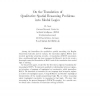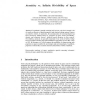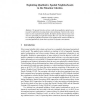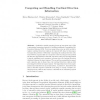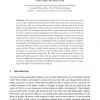112
Voted
FUZZIEEE
2007
IEEE
15 years 4 months ago
2007
IEEE
A central role of Geographic Information Systems (GIS) is to allow the identification and visualisation of relevant spatial features from typically large volumes of data. This requ...
104
Voted
ROBOCUP
1999
Springer
15 years 4 months ago
1999
Springer
In this paper, we present a multi-layered architecture for spatial and temporal agents. The focus is laid on the declarativity of the approach, which makes agent scripts expressive...
106
Voted
KI
1999
Springer
15 years 4 months ago
1999
Springer
Among the formalisms for qualitative spatial reasoning, the Region Connection Calculus and its variant, the constraint algebra RCC8, have received particular attention recently. A...
102
Voted
COSIT
1999
Springer
15 years 4 months ago
1999
Springer
In qualitative spatial reasoning, the last ten years have brought a lot of results on theories of spatial properties and relations taking regions of space as primitive entities. In...
99
Voted
SPATIALCOGNITION
2004
Springer
15 years 6 months ago
2004
Springer
Abstract. We present first ideas on how results about qualitative spatial reasoning can be exploited in reasoning about action and change. Current work concentrates on a line segm...
115
click to vote
EDBT
2004
ACM
15 years 6 months ago
2004
ACM
Qualitative spatial reasoning forms an important part of the commonsense reasoning required for building intelligent Geographical Information Systems (GIS). Previous research has c...
115
Voted
KI
2005
Springer
15 years 6 months ago
2005
Springer
To reason about geographical objects, it is not only necessary to have more or less complete information about where these objects are located in space, but also how they can chang...
104
Voted
RR
2007
Springer
15 years 6 months ago
2007
Springer
Geo-ontologies have a key role to play in the development of the geospatial-semantic web, with regard to facilitating the search for geographical information and resources. They no...
114
Voted
TABLEAUX
2009
Springer
15 years 7 months ago
2009
Springer
Abstract. The management of qualitative spatial information is an important research area in computer science and AI. Modal logic provides a natural framework for the formalization...
SEMWEB
2009
Springer
15 years 7 months ago
2009
Springer
In this paper, we present PelletSpatial, a qualitative spatial reasoning engine implemented on top of Pellet. PelletSpatial provides consistency checking and query answering over s...

